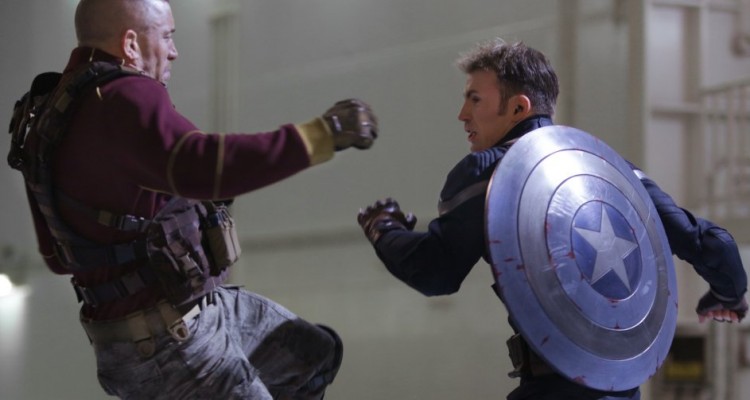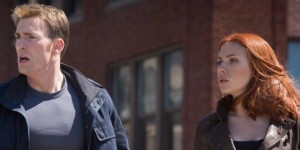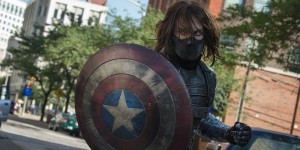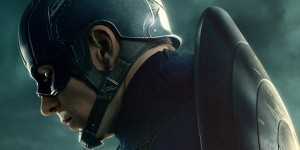CAPTAIN AMERICA: THE WINTER SOLDIER Discusses Political Paranoia

David Kahen-Kashi is a writer living in Washington, D.C. and…
“Dulce et decorum est pro patria mori” – Horace
“It is sweet and right to die for one’s country”. Most famously, and aptly, used by the World War I era poet Wilfred Owen in his poem, “Dulce Et Decorum Est-,” about knock kneed soldiers slogging through dirt and grime within dangerous trenches on the European front. The quote is haunting in both Owen’s and Horace’s context, even if it also belies a satirical edge. It’s a piece of wisdom that lampoons gracefully the ardent die hard patriotism that leads men to such early graves. But now we’re faced with an even more ethical conundrum. What happens when a warrior, so accustomed to an era of uniformed and dedicated patriotism, becomes frozen in ice and forced to acclimate to an unfamiliar world with strange customs and even stranger politics?
This is the kind of question posed in Captain America: The Winter Soldier, the sequel to Joe Johnston’s classically Spielbergian influenced entry Captain America: The First Avenger. A film that introduced the hero Steve Rogers, who, at first used as a piece of propaganda in the service of the USO (not unlike Audie Murphy, the most decorated soldier in World War II and also enjoyed a long career as a leading screen actor), grew into his own as a soldier in a time where good men were always good and the bad men were then just German Nazi’s in need of a good walloping. But in Anthony and Joe Russo’s entry, they find Captain America’s wrinkles pitting him against an enemy which, when utilized correctly, can evince proper emotional turmoil from the true blue hero. The Winter Soldier (played by Sebastian Stan), dressed in a drab uniform and sporting wildly unkempt hair, stands in the way of Cap from uncovering secrets covertly kept under wraps by S.H.I.E.L.D (the ever omniscient agency patrolling the ground and now the skies for super-powered threats to the world).
Trust is scarce – a recurring theme throughout Captain America: The Winter Soldier – and Cap must find a way to open the contents of a mysterious USB drive and find out why there is a rogue assassin murdering S.H.I.E.L.D agents.
Red Dawn
The most noticeable aspect of the Russo brothers film is how well it brings Captain America into a 21st century context. Where Thor: The Dark World might have been a space opera about the exaggerated characteristics of Thor’s universe, with more opera than space science fiction, Captain America: The Winter Soldier is far more emphatically a political thriller in the vein of Three Days of the Condor (also starring Robert Redford). Rogers, played with a squareness and good natured nobility by Chris Evans, is cast as an old codger in a young man’s body. He’s a 95 year old who is really 30, but his reference points end around 1945. So Rogers is shepherded around by Black Widow (Scarlett Johanssen) and Sam Wilson (Anthony Mackie) to cultural landmarks like Marvin Gaye’s soundtrack to Trouble Man, Nirvana, I Love Lucy, and Thai food. Rogers appeal is his perpetual status inside of a culture he doesn’t understand. It’s where most of the prominent moments of humor are sought out in the film. He’s out of his element as much as Chris Hemsworth’s Thor and his garrulous brand of energy was in Kenneth Branagh’s Thor.

Contrapuntal to that, Captain America: The Winter Soldier imbues a certain amount of elements where development between men like Nick Fury (Samuel L. Jackson) and Rogers get significant time to discuss their pasts. Notable among these are Fury’s explanation of his father’s life as an elevator operator and how he would walk around town with a paper bag filled with his lunch and a .22 Magnum. Rare is it in the Marvel world where two characters interact with each other beyond explanations that pertain to exposition and in Captain America: The Winter Soldier these moments are delivered with attitude.
Toned down is the overarching influence of Soviet politics associated with the character of the Winter Soldier. The comics emphasis his otherness far more with pronounced references to Russian as his spoken language. It’s hinted at in Captain America: The Winter Soldier, but not to the point in which it would have the ability to offend a significant amount of potential box office returns in foreign markets. The film, instead, turns inward into Captain America’s homeland. The Russo brothers have ample opportunity to use Captain America to tell a story far more political than necessary for a film of its stature and they do take advantage of Captain America’s inherently binary thinking within the film.
Patriot Games
Unique to Captain America: The Winter Soldier is the prevalence of a political discussion about current era issues that pertain to mass surveillance, monitoring by secret organizations and censorship. It’s a bold move, and while seemingly improper if for the only reason that this is a comic book movie, the politics elevate the film; giving it purpose, however loutish and heavy handed it can seem. Captain America is both an unlikely and perfect foil for this type of dialogue. Steve Rogers was built from the binary thinking of the 40’s: Good vs. evil, Allied vs. Axis powers, and now barbershop quartets vs. 70’s funk. Rogers follows Fury deep inside the depths of S.H.E.I.L.D’s massive complex in the middle of the Potomac river and gazes upon three giant Helicarriers meant to patrol the skies; built for the purpose of looking for future threats to national security using predictive technology to take immediate action against threats. Rogers is a soldier, a boy scout with a massive indestructible shield and superior intellect in planning, and when the potential of a surveillance state which clamps down on personal freedoms is presented to him, Rogers approaches the prospect with more than a bit of apprehension on his part.

“This isn’t freedom. This is fear.” Rogers says. Nick Fury’s rationalization is purely out of a Ronald Reagan era political scheme; explaining that S.H.I.E.L.D must take the world as it is and not as it should be. Should the people living in a peaceful society each be treated as a potential threat? Is the way to freedom secured by extending and developing a perpetual state of surveillance into the lives of innocuous and unsuspecting civilians ethically just? Marvel movies are rarely this political and the Russo brothers, along with the screenwriters Christopher Markus and Stephen McFeely, take the opportunity to critique current policies in a post-Edward Snowden leak world.
Alexander Pierce (Robert Redford), the head of S.H.I.E.L.D, often warns Rogers of the rift between friends and enemies. Pierce’s personal philosophy is encapsulated in his saying to Rogers: “Captain, to build a better world sometimes means tearing the old one down. And that makes enemies.” This confronts a world where trust is inherently in the hands of powerful entities whose intentions are often not entirely clear and where Steve Rogers, as the pure ideological entity he is, becomes a sort of reflexive being whose outdated nature is the very thing that enables Rogers to become the rallying point in which S.H.I.E.L.D eventually finds a way to rebuild. Ideally, Captain America: The Winter Soldier would use this reflexive attitude to do something far more understated and subtle in terms of a Marvel movie. There is a slight subtly implied in the film, but it’s only a matter of time before Captain America:The Winter Soldier recedes to the blockbuster haven of besieged maelstrom of action.
Conclusion
Captain America: The Winter Soldier is by far the best Marvel film since The Avengers. The addition of a political angle which exploits current anxieties and the unease of a mass surveillance state is quite refreshing to see in Marvel’s catalog. Jack Ryan: Shadow Recruit attempted to revive a character whose fundamental DNA is in taking political issues and giving them a heightened sense of immediacy toward the current era. However, Jack Ryan: Shadow Recruit failed to hit a nerve by couching itself safely in theatrics recycled from James Bond and Jason Bourne‘s films. When political thrillers do take advantage of current anxieties, they can succeed in creating a sense of foreboding, agitation, and as the best do, to question governments in rather flamboyant and absurd fashions. Captain America: The Winter Soldier contains a commentary about mass surveillance, drone warfare, and ruminates on the infamous kill list of men who pose a threat to national security while appealing the requisite amount of mayhem needed to appease the crowd that sees these films.

Given that comic book films have largely retained a formula that disparages ever cleaning house by killing off your darlings (Loki has survived death, Agent Couson tussled with the idea of dying and then lived again to headline his own television show and Pepper Potts escaped death in Iron Man 3), and Captain America: The Winter Soldier is no different, fighting for one’s country, home or universe, as the Marvel films widen their scope to include more and more characters into the fold, becomes more and more meaningless. A resurrection here or a false alarm there and all remains well enough to proceed into Captain America 3. What saves the Russo brothers film is an unexpected bout of political paranoia that adds dynamism to the film’s premise. Though if comic book movies continue down the route that makes matters of life and death a thing of the past, then the burden of finding that sense of irony in patriotism and sacrifice, as Captain America: The Winter Soldier deals with rather frequently, will be lost just as well.
What did you think of Captain America: The Winter Soldier?
Remember to like and share on Facebook, Twitter and other sites!
Does content like this matter to you?
Become a Member and support film journalism. Unlock access to all of Film Inquiry`s great articles. Join a community of like-minded readers who are passionate about cinema - get access to our private members Network, give back to independent filmmakers, and more.
David Kahen-Kashi is a writer living in Washington, D.C. and studies Literature at American University. He is also the Arts & Entertainment Editor at The Eagle and a writer at Movie Rehab. Mr. Kahen toils away at many things, most of which involve sitting in darkened theaters with strange humanoids.













